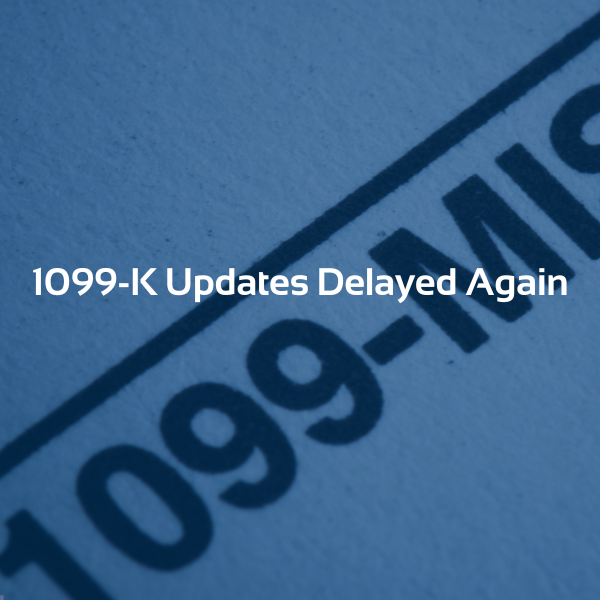
Earlier this year, we discussed Form 1099-K and the IRS’ plans to delay its updated reporting threshold until the calendar year 2024/tax year 2023.
In November, the IRS released Notice 2023-74, which details plans to continue this delay for another year, followed by a phased implementation.
A little confusing? Let’s recap from the top.
Who Receives Form 1099-K?
Form 1099-K, Payment Card and Third Party Network Transactions reports payments you received for goods or services during the year from credit, debit, or stored value cards such as gift cards and third-party settlement organizations, such as PayPal, Venmo, or Square.
Per the IRS, these organizations are required to fill out Form 1099K and send copies to the IRS and you.
This includes only goods or services and not payments from friends and family — no need to worry about the dinner bill you and Uncle Bob split.
The form’s purpose is to help ensure that all income received through third-party settlement organizations, like Square, is accurately reported on tax returns. The IRS claims that the form improves voluntary tax compliance.
The Changing Thresholds of Form 1099-K
In the past, Form 1099-K was only required if your payment transactions reached $20,000 and 200 transactions — a dollar and transaction amount typically reserved for small businesses or serious side hustles.
As part of the American Rescue Plan 2021, that threshold was to be dramatically reduced to $600 and any number of transactions — affecting many more Americans.
Then, at the end of 2022, the IRS announced that they were delaying the new requirement from taking effect in the tax year of 2022. Instead, it would be treated as a transition year for the reduced threshold, to reduce confusion and give the involved organizations and taxpayers more time to prepare.
Fast forward to this year — on November 21, 2023, the IRS announced plans to once again delay the implementation of the $600 and any number of transactions threshold another year.
To ease into the new threshold, the IRS is planning for a threshold of $5,000 for tax year 2024 — taking a phased approach to the planned $600 as part of the delay.
IRS Commissioner Danny Werfel on the IRS’ justification for the phased implementation, “We spent many months gathering feedback from third party groups and others, and it became increasingly clear we need additional time to effectively implement the new reporting requirements. Taking this phased-in approach is the right thing to do for the purposes of tax administration, and it prevents unnecessary confusion as we continue to look at changes to the Form 1040. It’s clear that an additional delay for tax year 2023 will avoid problems for taxpayers, tax professionals, and others in this area.”
The IRS also admitted there was complexity involved in differing the types of transactions that would require a tax liability, which contributed to the delay. We noted that this may be an issue in our previous blog, from May this year:
It’s also a lot more likely you sold a personal item for a gross payment of $600 or more, rather than $20,000. When the delayed changes go into effect, selling your prized Magic Johnson rookie card may be subject to the proceeds of a Form 1099-K filing with the IRS on your behalf by the third-party settlement organization. This will catch many taxpayers off-guard.
The IRS estimates that over 44 million 1099-K forms were prepared to be released but with the latest delay, the number of recipients that will be required to report will be greatly reduced.
MRPR is Here to Guide and Advise
Still have questions about the new 1099-K rules or their delay? MRPR’s team of tax experts is available to help you and your business navigate the ever-changing tax landscape.

Jordan Grant, Senior Accountant l jgrant@mrpr.com